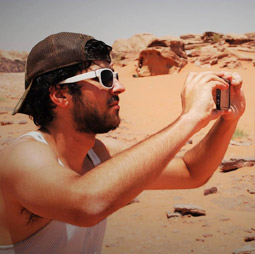How Teaching English Corrected My Misconceptions About the Middle East
Written By: Adam Lucente | Updated: June 29, 2023
Written By: Adam Lucente
Updated: June 29, 2023

I met Samir at an English-language primary school we taught at in Amman, Jordan. He first caught my attention when he walked into the break room where I was sitting with an American colleague and said, “Hello, American people.” Samir and I got along well, and one day we made plans to meet up after work. He wanted to go to a cafe that had banana and milk cocktails – his favorite drink.
“O.K. so we meet at the cafe at 4 pm. It’s OK?” Samir asked.
“Inshallah,” I replied, which is Arabic for “if God wills.”
Muslims and others in the Arab world often use this term. It can mean anything from “yes, definitely” to “probably not,” depending on the context. Samir was perplexed by my use of the term.
“Why if God wants? He doesn’t decide,” said Samir.
Now I was perplexed. I was new in Jordan, and I figured most people were somewhat religious Muslims. I certainly didn’t expect what came next, as Samir spoke to me in Arabic.

“There is no God. I say ‘inshaa Samir’ because I am the one who decides,” he said.
Although I knew Arabic and studied Middle Eastern history before teaching in the region, I still had a lot of misconceptions before moving there. Teaching helped me correct this.
Samir was from southern Syria, and worked in Jordan so he could avoid mandatory military service in his home country and also send his brothers money so they could develop a property they had bought. His family was Druze, referring to the ethnoreligious minority in Syria, Lebanon, Jordan and Israel. Their beliefs are secret, but Samir didn’t believe in them, whatever they are.
Through hanging out with Samir and his friends, I learned that there are plenty of atheists, agnostics, non-believers and other like-minded people in the Middle East. Before I moved there, I thought such views were kept secret because of their stigma in Muslim society. This is true to an extent, but I ran into many more non-religious people of Muslim and other backgrounds than I anticipated.
Teaching corrected other misconceptions I had, too. I thought most Iraqis would hate former president George W. Bush because of the 2003 invasion, for example, but when I went to teach in the Kurdistan Region, I learned many Kurds revere him.
One important thing I learned is to not to judge people by their clothing. I associated women covering their hair with piety, conservatism, and, to an extent, closed-mindedness when I moved to the Middle East. However, my female students taught me that what you wear doesn’t necessarily determine your views on gender relations, religion, politics, and more.

Moreover, after many, many taxi rides, I learned that lots of people in the Arab world adore American culture, even if they adamantly oppose American policy in the region at the same time.
Not all of these learning experiences were positive. I hoped most criticisms of Israel in the Arab world were rooted in opposition to Israel’s policies, and were not based on anti-Semitism. My experience said otherwise, though. A great deal of my students openly admired Adolf Hitler, and “Mein Kampf” is widely available in Arabic in Jordan, Egypt, and other countries. Hateful views towards Jews, gays, Shia Muslims, and several other groups is something to be aware of in parts of the Middle East.
Teaching abroad is not just a chance for you to correct misconceptions you have about a region; it’s an opportunity for you to correct locals’ misconceptions about the U.S. and the West. For example, I’m often told I don’t look American in taxis. I have dark, curly hair, and am usually fairly tan in the Middle East. In 2014, when I first moved to Tunisia, I used to say “does Obama look American?” in response. I took it upon myself to tell the taxi drivers that while most Americans have European ancestry, all Americans, from the Native Americans onward, came from somewhere else.

Other times, again often in taxi cabs on the way to teach, I found myself acting as a sort of unofficial ambassador of the U.S. I’m always asked to explain everything from Trump to the difference between American football and rugby. I value these conversations as important cultural exchanges that inform both participants, and make teachers better suited to understand their students’ culture.
When I did my in-person TEFL certification through ITA, our instructor told us that we will learn as much as our students do when we go teach abroad. Regarding misconceptions I had about the Middle East, I can say for certain this is true.
Posted In: Teach English in Tunisia, Teach English in Egypt, Teach English in Middle East, Teach English in Jordan
Adam Lucente
Adam Lucente is a journalist and English-language teacher from New York City. He learned Arabic in college and has since taught in Tunisia, Jordan, and the Kurdistan Region of Iraq. As an ITA Alumni Ambassador, Adam has shared many of his experiences and insights with others interested in teaching in the Middle East through numerous articles.
Want to Learn More About Teaching English Abroad & Online?
Request a free brochure or call 773-634-9900 to speak with an expert advisor about all aspects of TEFL certification and teaching English abroad or online, including the hiring process, salaries, visas, TEFL class options, job placement assistance and more.
"The Middle East is a very fascinating and unfortunately an extremely misunderstood area by so many. In a lot of ways, it’s an extremely easy place to adjust to, Western luxuries are quite accessible and almost everything is in English and Arabic."

- Katie Ayers
Teaches English in the UAE







